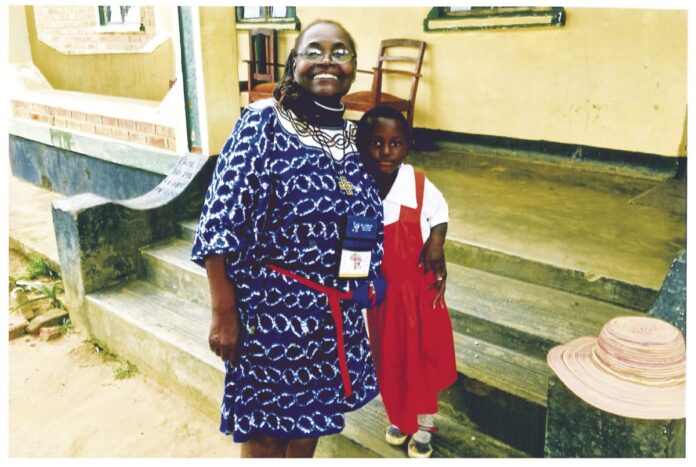HARLINGEN — So much with so little.
That seems to sum up the Rev. Meizie Salinas’ impression of Malawi and Zambia after a recent mission trip to Africa.
“It was a very inspiring trip,” said Salinas, a deacon at Treasure Hills Presbyterian Church, 2120 N. Ed Carey Drive.
She and her husband Eddie Salinas, a church elder, traveled to those two African nations in May. The purpose of the trip was to see how funding from the Church of Central African Presbyterian was being spent. They looked at water wells, churches and a seminary all built through donations from the CCAP.
“We went to see their needs, what money has been spent in the past and exactly how the monies are being used,” said Salinas, a former U.S. Army special forces chaplain.
She met her husband, a Vietnam veteran, while attending a function of the Disabled American Veterans.
During the trip, water wells were a major concern. Money had been wisely spent on construction and upkeep of wells in the areas they visited. But…
“There were just not enough of them,” she recalled. “They are so far apart. They need more.”
One well costs $450, she said. When she and her husband give a presentation about their trip, one of the points they will mention is the need for more wells. Many of them have been sponsored by the Presbyterian church, but there are also opportunities for individuals to sponsor a well.
She recalled seeing people in those African villages walking miles to a nearby well.
“They are in the process of putting some kind of locator so they will know where the wells are,” she said. “One of their main sources of income is corn. They have started housing the maiz so that it can be sold to make money. We contributed to that.”
They also looked at educational needs.
“It takes $150 to sponsor a student for one year,” she said. “That includes their uniforms and tuition.”
That’s one need they will point out during their talk. Hopefully, churches and individuals will begin sponsoring students. Education, she said, is a premium in the areas they visited.
“We visited a university that is teaching agriculture,” she said. “It’s in the making, but they have the chickens and they showed us mushrooms and things like that.”
She was noticeably impressed by the abundances of languages.
“There are dialects, but there were some who spoke several languages,” she said. “I just thought that was really incredible.”
This linguistic wealth was especially evident at a church in Zambia where she preached. The first three-hour service was in the local language. She then preached in a two-hour service in English, while someone else translated.
“That was a nice experience,” she said. “They were beyond friendly.”
Her husband Eddie was likewise inspired.
“It was life changing for me,” he said. “They had church in their language. I almost backed out of it because I have a fear of flying. I went and came back with a different perspective.”
Reflecting on giving a sense of purpose
HARLINGEN — Out of Africa.
Back to Africa.
Ever since Meizie Salinas, 67, journeyed to the Congo in 1990, she’s reflected regularly on the trip’s connection to her sense of purpose.
“I saw myself being transformed when I came back,” said Salinas, who has taken numerous missionary trips to Africa since that initial visit.
Those trips have resulted in a collection of memories, experiences, insights and hobbies.
A broad range of works in cloth reveals her love of textiles.
“The fabric is from Africa, but I made it,” she said, looking at a wall hanging inside her front door. She’d assembled different pieces of fabric bearing images of masks.
Wooden masks hung from walls throughout the house. They carried the energy of distant passions. Within the punctuated features lay the rhythms of those on far away shores.
“I have seen the dances,” she said wistfully.
Why Africa?
“It was because of my ethnicity,” she said. “I have no direct ties to Africa but it’s my motherland.”
The transformation was visible in her words.
“I saw in so many ways how blessed I am,” she said. “I realized they always held me in high esteem because I was a missionary.”
Her love for Africa reveals itself in her pastimes. Scissors and brightly-colored spools of thread fill a room where she cuts out African images and sews them into cards and bookmarks. She also makes clothing with African motifs.
A banana peel wall hanging depicted red-clothed villagers walking toward peaked huts. Tall, slender wood carvings rose from an indoor window sill facing a Jacuzzi. Images of wooden giraffes melted into forks and spoons.
Leather couches and other furnishings were covered with zebra print.
“That represents the mixing of the races,” she said of the zebra print.
She moved toward another part of the house with an image of her face attached to a figure of Marilyn Monroe.
“Big wheel keep on turnin’, Proud Mary keep on burnin’,” she said, breaking into the Creedence Clearwater classic she danced to during the Miss Senior Texas she won in 2013.
She spoke with equal adoration of her love for Marilyn Monroe.
“She was just very sexy,” she said. “She was an icon. I grew up admiring her.”
Missionary — A military family
HARLINGEN — When Meizie Salinas ventured to Congo as a missionary, she’d already concluded almost 20 years as a chaplain in the U.S. Army Special Forces.
As such, she went through all of the training any other member of the elite group must take.
“It was hard work,” she said. “It was a challenge. It was in the late 60s and early 70s, so it was adventure.”
It was only fitting she would spend many years in the military. She comes from a long line of military veterans beginning with her great grandfather who bears an interesting story himself.
He was only an infant when a couple of German immigrants found him lying on the ground near Calhoun, Oklahoma. They raised him as their own and he later served in the military as did his son and grandson. Meizie’s brother and sister also served in the military.
Salinas’ military career was cut short by an injury.
“I jumped one too many,” she said with a laugh.
But, she kept working, carrying her message to the Congo and other parts of Africa.





